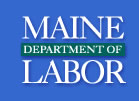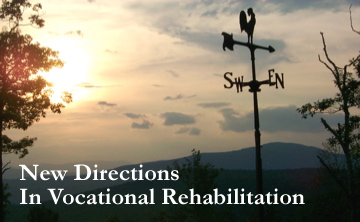 |
|
Maine Department of Labor, Bureau of Rehabilitation Services
|
Volume 1, Number 1 |
 |
Welcome
Welcome to the bi-monthly Eliminate the Waitlist newsletter. In an effort to keep all staff updated on our progress with this very exciting project, I will be compiling information to send out to you every other month. For those of you who haven't met me, my name is Betsy Hopkins and I was recently hired in Central Office to spearhead this project. I started over 15 years ago as a VR counselor in Southern Maine, and then moved on to a VR casework supervisor out of AUGUSTA. For the past 6 years I have been working with Developmental Services as a Regional Supervisor. I am pleased to be returning to VR, and have enjoyed meeting many of you in the working groups, as well as at your VR staff meetings. In these times of change, we realize at Central Office that it is better to communicate MORE often rather than LESS, so that your questions and concerns about this project are addressed along the way.  This first newsletter is going to be an overview of the project thus far, and the project outlines for the next year and half. I absolutely welcome your feedback and any concerns or comments you may have. If you want, you can ask questions, or provide feedback by accessing the Project Feedback form. You can also provide feedback through your local offices to the people who are involved in the small groups or to the group leader. Thanks and I look forward to continuing our work together on this project! This first newsletter is going to be an overview of the project thus far, and the project outlines for the next year and half. I absolutely welcome your feedback and any concerns or comments you may have. If you want, you can ask questions, or provide feedback by accessing the Project Feedback form. You can also provide feedback through your local offices to the people who are involved in the small groups or to the group leader. Thanks and I look forward to continuing our work together on this project!
|
June 2009

Welcome
Message from the Director
Project Overview
Working Groups:
• Entering the VR System
• Plan Development
• Plan Accomplishment
• Exiting VR
• Data and Technology
|
|
BRS Director Scribbles
Thank you for the incredible passion and commitment that each of you bring to our work. I applaud the energy and enthusiasm I see and hear about as the steering committee and each task team tackles the issues that challenge us. I look forward to reviewing the completed recommendations from the four teams at the end of the summer. We will continue to use this newsletter and a variety of other tools to keep you all posted about our progress with the Waitlist project.
Change of any sort can cause stress and anxiety, yet I am confident that DVR will emerge from the ambitious recovery project work that you have taken on, a leaner, more efficient division - for our customers and for our staff and our agency partners.
Jill Duson
|
|
|
Project Overview
Maine's Division of Vocational Rehabilitation is embarking on a major initiative to eliminate the wait list and provide the "right service at the right time" to its consumers. Maine DVR plans to go "back to the basics" by evaluating each major process point with consumers. DVR has identified these points as: "Entering the VR System", "VR Plan Development", "VR Plan Accomplishment" and "Exiting the VR System". The goal is to provide services to all eligible consumers at the time that they need them to achieve competitive, community-based employment.
Use of Recovery Act money for the project: Maine Bureau of Rehabilitation Services American Recovery and Reinvestment Act of 2009 money has regulations that will allow for the department to hire limited-period positions providing they offer support to Title I applicants/clients.
The time limited project staff will assist DVR in implementing our streamlined service delivery process that will address the vocational service needs of individuals and eliminate the need for a waiting list for services. The major system redesign will eliminate the need for these time-limited positions within the 2.5 year period of funding availability. These funds are targeted to achieve sustainable system improvements, improvements from which our customers will continue to benefit long after the stimulus funds and the project positions are gone. Each VR office along with assistance from supervisors and regional managers will be responsible for hiring and determining how best to use these individuals.
Back to top |
Jill Duson-Leader
Art Jacobson
John Shattuck
Karen Fraser
Betsy Hopkins
Paul Cote
Chris Littlefield
Dale Roupp
Mary Borelli-Bean
Catherine Singleton
Louise Sidelinger
Barbara Michaud
Peter Diplock
Samantha Fenderson
Joshua Howe
|
|
Working Group: Entering
the VR System
Goal of this group: This particular initiative seeks to review the way in which applicants enter into our system, how eligibility is determined, how Order of Selection classification is made, how work readiness is determined, how Trial Work Experiences are utilized and whether Extended Evaluation should be reinstituted. The team will develop and implement an Action Plan to deliver necessary changes. The goal will be to improve entry to the VR system, which will enable work ready clients to be served more quickly and appropriately. To Date: Several meetings have been held to discuss ideas and focus the work through four sub groups: Referral process, Orientation and Intake, use of the Trial Work Plan, and use of the Order of Selection (OOS). Tasks include developing a state wide application/intake and referral process, which then leads the consumer to a statewide orientation to VR and a new orientation presentation that will be widely accessible in a variety of formats. This group is also considering the recommendation of reinstating Status 06 for counselors to use when additional testing and evaluation is required to determine if applicant is able to benefit from VR services.
Back to top |
Chris Littlefield - Leader
Peter Diplock
Kathy Despres (CARES)
Abbie Miller
Angel McInnis
Linda Besore
David Utter
Anita Hesketh
Rosie Hartzler
Audrey L’Heureux
Beth Coombs
Barbara Greenstein
Jackie Healey
Stephen Crate
Carol Mitchell
|
|
Working Group:
VR Plan Development - Status 10
This group's goal is to address the specific process of vocational goal development and plan writing. This team will review current activities and counselor practice in developing vocational goals and identifying services needed to achieve employment outcome for clients, as well as consider alternative tools and tracking systems. Currently, the Bangor office is piloting an Employment Readiness/Career Exploration Workshop to be used with clients after they have been determined eligible for VR and before they develop an IPE. Further work needs to be done regarding how this workshop would be implemented, who would take on the role of trainers, and how it can be accessed by many different groups of clients at a time. Other areas being investigated in this group are the use of situational assessments and how to keep track of people's time in Status 10, so they don't stay there indefinitely with little or no contact from the VR counselor. To Date: The large group has been broken into four sub groups to focus on Employment Readiness, Comprehensive Assessment, Students in Transition and Status 10, and the Use of Trial Work or situational assessments. Several best practice protocols are being developed regarding the above areas.
Back to top |
Dale Ruopp - Leader
Melissa Caron
Susan Chesler-Doherty
Joshua Howe
David Nadeau
Joseph Roquebecil
Mike Shirley
Sheryl Smith
Anne Wheeler
Frank Zeller
|
|
Working Group:
Plan Accomplishment
The focus of this team is on the provision of services deemed necessary for a person to reach a vocational goal. The services that may be provided include but are not limited to: vocational counseling and guidance, job development and placement, job coaching, on the job training, other training and education, tools and equipment, information and referral, physical and mental restoration, home modifications, rehabilitation technologies and other modifications, interpreter services, occupational licenses and initial needs, self-employment assistance, and time limited on-going support services for those requiring supported employment. The team is looking at how services are currently being provided and make recommendations for how to improve quality and cost of these services. This will include how VR works with a variety of vendor systems, including those with whom we contract for technologies, modifications, and Community Rehabilitation Providers. This team will also look at and examine relationships with sources of comparable benefits (DHHS, VA, FA, BES, etc.) To Date: Exploring and researching the following: Setting up specific vendor contracts for hearing aid dealers, computer purchases, eye glasses, etc., writing several more guidance memos (similar to the ones for education and self employment plans) that would include referrals to job development, and using a Results Based Funding model with community rehabilitation providers.
Back to top |
Mary Borelli Bean - Leader
Amy LeVasseaur
Barbara Michaud
Rebecca Pappas-Jones
Valerie Oswald
|
|
Working Group: Exiting
VR
This subsection seeks to review the way in which our clients exit the VR program. It will explore other State models and make recommendations for needed changes regarding how we will improve our current process. Improving how people exit the VR system from whichever Status it occurs will improve the flow of cases, so that individuals will be served more effectively once the wait list is eliminated. Suggestions for improvement to date include: Implementing a consistent VR reapplication form along with several best practice closure letters to use that outlines clearly why a person was closed, and what steps the person needs to take before reapplying to VR. This group is also updating the Case Review Forms to provide more consistent feedback to counselors, and developing a guidance memo for counselors to use when needing to close someone's case.
Back to top |
Cathy Singleton - Leader
Chris Bean
James Howard
Priscilla Coffin
Allison Trussell
Beth Lehning
Kim Waite
Sue Primiano
Sharon Lowrey
Janet Schlegel
|
|
Working Group: Data and
Technology
The Data and Technology group works to support the Wait List Project teams by providing technical consultation, research, data analysis, and is leading the project to replace the existing electronic case management system, ORSIS. The ORSIS project team has talked to numerous states regarding what they are utilizing for case management software, whether commercial or developed in house. We have also been in touch with and had demonstrations from two vendors of commercial software and are in the process of arranging further sessions with the vendors. We are waiting on documentation and the source code on Washington State's system, STARS, for evaluation. David Poulin and Joshua Howe have been updating previously created specifications for a new system, and incorporating new requirements, wants and needs. For more detailed information on work of the Data and Technology project team, please visit the project team page on the intranet.
Back to top |
Joshua Howe- Leader
Karen Fraser
Anita Oliver
Mary Borelli Bean
Jeremy Barnard
David Poulin
Scott McNeil
|
 |
| Copyright 2009, Maine Department of
Labor, Bureau of Rehabilitation Services |
|